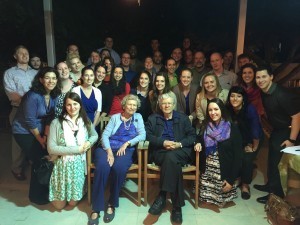One of the ways we learned about Israeli society was to spend a few nights at a kibbutz. A kibbutz is a collective community, traditionally based in agriculture, that was the way many Israelis used to live. Even though the kibbutz life was outside the comfort zones of some students initially, hanging out in the evenings together brought lots of laughs, memories, and a great development of our own class community.
Alexa Callahan shares one of her more humorous moments.
A kibbutz is an Israeli agricultural community where members live collectively amongst each other. In Hebrew, Kibbutz means “gathering” and “clustering.” We stayed at Kibbutz Hukuk near Tiberius our third and fourth nights in Israel. Upon arrival, the Kibbutz reminded me of summer camp. We stayed three to a room and each group had their own individual quarters, which included three twin beds, one pillow each (Israelis must not use a lot of pillows, as there was a shortage of them throughout the whole trip), and a small bathroom that included a sink, toilet, and shower. If you still cannot picture this Kibbutz, here is another analogy: Have you seen “Lost”? It is like the Dharma Initiative village, which made staying in the Kibbutz even better.

